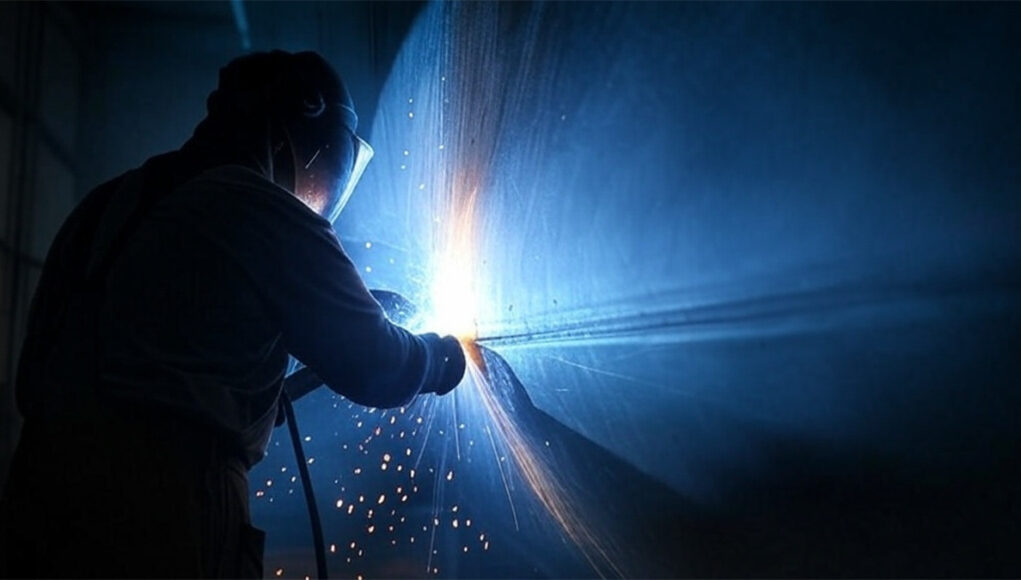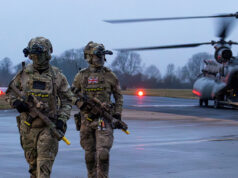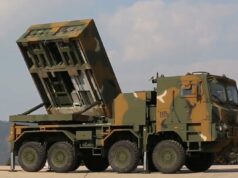The UK defence industry could create 50,000 additional jobs by 2035 if government spending rises to 3% of GDP, according to new analysis released by trade body ADS.
Employment in the sector already stands at more than 180,000, with most jobs outside the South East and paying above-average salaries. The ADS modelling suggests that a long-term uplift to 3% of GDP would not only expand the workforce but also raise the sector’s gross value added to the economy from £15 billion in 2024 to £23.5 billion in 2035, an increase of over 50%.
If commitments rise further to 3.5% of GDP, ADS forecasts the creation of 85,000 direct jobs in defence.
Kevin Craven, CEO of ADS, said the figures demonstrate both security and economic value. “The primary purpose of defence and security is to protect and deter – but in the process, the value we provide to the economy is increasingly critical to innovation and prosperity,” he said. “With a deteriorating security environment, the government’s acknowledgement of the need to immediately bolster our defence is hugely welcome. An increase in spending of this magnitude delivers on the long-term demand signal that helps the defence sector to do what we do best: deliver capabilities that are needed to uphold our security, in a way that delivers value for money to the citizens we are here to protect.”
He also argued that the sector’s contribution to society is often overlooked. “While the cost of living rises and societal pressures increase, it’s right that we are raising awareness of the good that we, as a sector, provide for the UK tangibly for citizens,” Craven said.
“Our sector drives social mobility and prosperity through the high proportion of jobs we offer people from all walks of life, through the international opportunities and high-tech development partnerships we build, and through the wide range of improvements to civilian life and everyday technology that originate in our sector.”
The findings come ahead of the launch of the government’s new Defence Industrial Strategy, expected to be announced on 8 September. ADS, which represents more than 1,600 companies in aerospace, defence, security and space, said the data was shared with officials before the strategy’s release.
The trade body notes that growth would be driven by the combination of higher defence spending, rising exports, and broader economic expansion, with the UK continuing to exceed NATO spending targets.














It is not wise to obsess over a percentage. Personally I would anticipate the capital budget needs to double until such time as we have ample kit in all areas and we need to be creative when it comes to people. The military needs all types with a vast range of skills. We need to plan and implement not worry too much about the cost.
its vital to obsess over percentages. The UK could spend zero on defence and face no significant military threat just like Ireland does. We choose not to. With no actual threat to face off against and only alliance contributions to make and budget must be reference against the size of the economy.
Failure to do this forced Hitler to go to war in 1939 and loose badly, it also caused the Soviet union to collapse and is rapidly cause the collapse and eventually break up of Russia. its the oldest argument in economics of guns vs butter.
its also worth point out that we very much need to worry about how much we spend as the country is running a massive budget deficit after spending that last five years not worrying about how much it spent.
In 1960 Jim the UK was spending about 7% and yet it was building it’s commitment to the NHS, Schools etc. We need to have a defence strategy which deters and we have had that for 80 years until now when our enemies are wondering if they might just have an advantage. If the UK simply got a shopping list together which enhanced and modernised our defences they are likely to get back in thier box and stop testing their boundaries.
Hitler transformed a poor economic situation at home in an attempt to expand German territory and influence and he very nearly got away with it. Putin has similar plans and we have not showed our determination to do what it takes to defend ourselves and our allies. A full scale war in Europe would cost us at least 50% of our GDP and a far larger deficit.
Spending more on Defence is about defence, not job creation. It’s deterring war while keeping the world stable, and we need to justify it on those grounds time and again, because people pay that lip service without understanding or even believing it. As soon as you make it about jobs, people will do the maths and say, quarter of a million a year per extra job! Or whatever it is. Extra jobs are a bonus in times of high unemployement. Right now, they aren’t even all that.
Jon, the notion that the traditional Labour Party freely spends money on defence is against their social conscience, and only does so when it has to. I know modern labour thinks a little differently, but the pill is enriched if it generates jobs, especially in deprived areas, ‘Hillman Imp’ springs to mind. However, most recent governments have treated defence as the elephant in the room. So much for the lessons from history.
The notion of every British government since 1707 and every Anglo sphere government for that matter is that government should never spend freely on defence.
That policy allowed us to grow our economies and improve our people to generate sufficient capital to become the dominant military and political force on the planet for over two hundred years.
Which is exactly what governments, and especially this one, are doing.
Every announcement has the jobs and change references.
Not a peep about military capability beyond the tiresome “Keep Britain safe.”
But it is all about jobs, because a core part of deterrent is the ability to wage a continuous ongoing war through industrial capacity, the modern western mind has a bit of blank to the reality of what war is, we have due to our modern history and sensibilities boiled it down to the idea of the swift campaign in which we send off our military to win or loss fast. But warfare between great nations and cultures is “history” not a moment, it’s the clash of everything a nation is and core to that is its industrial capacity and its ability to lever a mercantile strategy using that industry. China is probably the only nation that remembers this and it’s why it will hang the west out to dry if it’s not very careful. The winners and losers in history and war have always run on industrial capacity.
Even in the pre industrial world, the ability to lever skilled jobs was what defines great empires… what differentiated the Roman legion from any other force apart from tactical discipline was the fact they were essentially vast civil engineering job creation operations, Rome conquered and grew because the jobs for the boys was road, bridge and fortification building.. essentially Rome literally built its empire stone by stone using a huge professional and slave workforce.
How did Spain become the greatest imperial power of the new world and gain hegemony for 200 years until the 1700s ? It used it technological edge and maritime industrial capacity to dominate and control resources.
And the first true industrial nation unsurprisingly created the largest empire to ever exist in history.. purely on the back of industrial capacity. It created a maritime strategy that no other nation could keep up with it and at its hight a third of the worlds ships were British and 25% of the worlds goods passed through British ports.. and through these jobs it broke millitary powers far greater than itself and it did it over and over, defeating some of the most powerful militaries the world has ever seen..this important for later..
Then we get to the 20 century and the clash of political paradigms and these paradigms rose and fell purely on industrial capacity.. Japan lost to the U.S. because of the vast industrial capacity of the U.S… Germany lost to the allies because of the vast difference in industrial capacity… and the key fact is both Germany and Japan has profoundly good military’s when they started the conflict.. infact the German land and air forces were essentially unmatched.
Finally we get to the Cold War, the Cold War was a political and mercantile war rite large, and it was in the end won by the focused leverage of industrial capacity.. Ronald Reagan simply outspent the USSR leveraging the USAs industrial capacity and forced it into bankruptcy.
When we look at the now what is happening china is not just following a naval strategy to take Taiwan, its following a strategy of complete maritime dominance and its leveraging its massive industrial capacity to do this, China now has over 50% of the worlds ship building capacity, it owns 25% of the worlds ships and 30% of the worlds goods when through Chinese.. ports. Because the Chinese take note of history and they don’t believe in the short war..they believe in the long struggle of nations at that it’s the jobs in that nation that win wars not the military you have..because when the important wars start most of that original military will be dead, gone or subsumed before the war ends and what wins those meaningfull wars is what you can make…
I’d say industrial capacity isn’t about number of jobs. It’s about the ability to ramp up on demand, to make the most of dual use, to ensure that if there’s a war, industry can kick in with replacements before stockpiles run out. In many ways, the idea of a fast ramp-up is antithetical to lots of jobs. We need to invest in machinery that can produce far more almost at the flip of a switch. If you need lots of jobs to produce something, how are you going to produce many more units quickly when that would need lots more people?
Hi Jon,
You are partially right. Industrial capacity is indeed about industrial productivity, which is basically what you are describing but it still requires people with suitable skills to pull it all together, despite the idea that AI is going to make us all redundant… During the two world wars millions of women were mobilised to work in the factories to run double or 24/7 shift patterns depending on the production processes. It is entirely possible to train people to operate a single type of machine in a say 6 to 12 weeks. In other words a mix of skill levels allows the rapid increase in the work force, provided you have a skilled work force build up in peacetime around which you can mobilise a wartime work force. Basically, it is the same mobilisation concept as used by the military.
We are talking about a war of national survival here. Our way of life and our freedoms will also depend on our allies as theirs will depend on us. Europe has huge military and industrial potential and some countries are even seeking to realise that potential, but it is too patchy as yet and the UK appears to be lagging at this stage. If we can regenerate our industrial base we might just stand a chance, because it is not just Russia we will face, it will be the CRINK Axis. China says it want a multi polar world, but will it be satisfied if and when it achieves that or will it seek to dominate the globe as other have done in the past. My bet is on the latter.
So we will need as many people as we can get mobilised and the best possible level of productivity we can achieve and sustain to survive if we fail to adequately deter.
Cheers CR
The problem is in the modern world fast ramps depend on skilled and professional workforces…
The reality of modern complex industries is that the capital stuff is is actually quite easy.. but the workforce is another level of difficulty to plan and that is what creates the block.
Five years is the key figure.. in modern complex industries it takes five years to create an expert professional at that specific level in that field.
So I will take my own industry healthcare and a an urgent care professional
Years 1-3 are education, essential creating the foundations as either an apprentice and or higher education so your 18 year old starts their training and is a shining new ( think they know everything but know nothing professional) at the age of 21
Years 4-8 First job basic professional.. staff nurse, junior physio, pharmacist etc so your 18 year so first job at 21 by 26 they actually know what they are doing running the lowest tier profession roles.
Years 9-13 Middle grade and training up as specialists.. this is when you start in the roles as a supervisor or specialist by 27 to 31 years of age.
Years 14-18 Specialists and line manger of units at this point your running a smaller unit or the whole shift on a large complex unit, your a jobbing expert in your field.
Years 19-23 strategic manager, at this point you’re running a major service at a strategic level.
You can only get these levels of experience if your actually employed in a unit working..
As always everywhere in the UK benefits except the North East of England
There seems to be considerable back sliding from HMG as the economy failures in achieving stated defence targets. The OBR stated defence expenditure for fiscal year 2024-2025 was around 2.24%, this year it will be around 2.32% with a stated ambition of getting to 3% by 2027-2028 so definitely behind where we should be. That’ll be why key projects and intended outcomes from SDSR haven’t even been funded and why the UK armed forces remain in a deadly perilous state.
The RN is “missing” at least 6 frontline escort warships from the declared “at least” 25 destroyers and frigates.
The army has just 14 Archer SPGs and the RCH 155 guns reportedly on order are coming into service when exactly and how many?
Warrior is a dead carcass and needs replacing. C2s need all upgrading to C3 standard. Having just 148 mbts is not going to be anywhere near enough.
GBAD despite the new land Ceptor order still means even with this order the UK has inadequate firing units and batteries. Just 12-28 firing units.
The RAF is lacking in key AWACS capabilities and the laughable 3 wedgetails should be immediately put back upto 5 with an intention to get to 9 by 2030
Poseidon MPA- just 9 in service, the RAF urgently needs at least 6 more.
Fast jet fleet seriously under resources. The UK can call upon no more than 100 typhoons and 36-47 F35Bs increasing by 2030 to 47 F35Bs and possibly 12 nuclear roles F35As.
In short it’s a disgrace and the situation bequeathed to the current government after 15 years of Tory government is nothing short of a cluster feck disaster.
“a stated ambition of getting to 3% by 2027-2028”
I don’t think so. The target is to reach 2.5% (or 2.6% including new security spend) by 27/28. We’ve an aspiration to reach 3% by 30/31(ish), and a target to reach 3.5% by 2035. Like the extra from 2.5% to 2.6%, not all of that budget will be spent on what the man on the Clapham omnibus would consider defence.